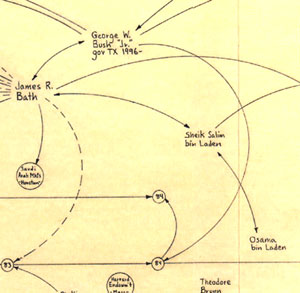| Sunday, April 20, 2003 |
| Empires of Debt |
 Excellent article from New York Times, The True Cost of Hegemony: Huge Debt. (Registration required). Excellent article from New York Times, The True Cost of Hegemony: Huge Debt. (Registration required).
It examines the strange picture of how the apparent U.S. power is paid for from borrowed funds. And a lot of the money comes from overseas. The U.S. government is now occupying Iraq, but optimistically has set aside hardly any money for reconstructing the country. Can the United States provide the necessary cash, even in the form of private-sector money? The answer is yes — so long as foreign countries are willing to lend it to the United States. For the fact is that America is not only the world's biggest economy. It is also the world's biggest borrower. Its muscular military power is underwritten by foreign capital.It is an unusual situation. When Britain was playing empire, it was able to do so because it also acted as a bank for the world, and it would invest a big chunk of its capital on overseas infrastructure. When the U.S. took part in the two world wars, and built up Europe with the Marshall Plan, it was all from a position of financial strength, where the U.S. actually had a surplus to take from. But now, since the time of Ronald Reagan, the United States economy is run to a large extent like that of a third world developing country, depending on foreign willingness to invest heavily into it, despite questionable returns. The only example from the past of a great empire relying on foreign loads is Czarist Russia under Nicholas II. Looked good for while, but eventually it collapsed, from the costs of war, and it collapsed politically and turned into a communist country. [ Politics | 2003-04-20 12:55 | 1 comment | PermaLink ] More > |
| You are here |
From SmartMobs:"Allen the gadgeteer has created a Java app, available for download to a Motorola i88s phone that records your position and uploads the info to a web site every two minutes. The site displays a map of where you are. You can also mark a location to check the map later to see where the spot you marked is. Instructions on how to load and an explanation of how it works are provided."And Richard Soderberg comments: "Combining the current location system with a layer of identity authentication -- friends on your AIM buddy list, for example, that have permission to see where you're at at all times -- or only during the day.Yes, I don't see why not. Except for that I might develop some crazy enemies who will use it to program a personal cruise missile for me, I don't personally see much bad about it. Well, let me think a little more... I don't really mind informing my friends and family of my whereabouts. I would think it would be fun if my weblog readers could find me on a little map. If it can entertain them to figure out I just walked into a strip club in Palm Springs, all the merrier. But whether I like that for everybody all the time depends on what kind of behavior patterns others develop around me. I have Instant Messenger programs running all the time on my computer, and I don't mind for most people to know I'm online. But some people think that when I'm obviously there, it automatically means I have time to respond to anything they'll feel like sending me. It doesn't. I might want to retain the option of not talking with you, even though I'm not hiding that I'm at my computer. Likewise, some people might think that if my physical location is visible, it means that they can just come and join me. It doesn't mean that. But we need some better ways of flagging our availability, or for some algorithm to figure it out. I have a hard enough time getting my family to guess who's phone calls I would want to take and who's I don't at any given time. [ Technology | 2003-04-20 18:59 | 5 comments | PermaLink ] More > |
| Mark Lombardi's global networks |
 Weblogsky mentions the late Mark Lombardi who created hand-drawn network maps, which he called "narrative structures". They show the relationships between political figures and financial fraud, criminal activity, busted banks, etc. Weblogsky mentions the late Mark Lombardi who created hand-drawn network maps, which he called "narrative structures". They show the relationships between political figures and financial fraud, criminal activity, busted banks, etc. "At some point in my development," says the artist, "I began to reject reductivist approaches in favor of one capable of evoking the complexity, venality and occasional brutality of the times. What emerged was a study of 'irregular' financial transactions, with special emphasis on those undertaken in secret by select groups of influential yet silent partners."I think there ought to be a well financed team of independent investigatory journalists doing nothing but creating such maps all the time, with supporting information, and posting them on the net. Show us how things connect. Because they do. [ Patterns | 2003-04-20 23:21 | 3 comments | PermaLink ] More > |